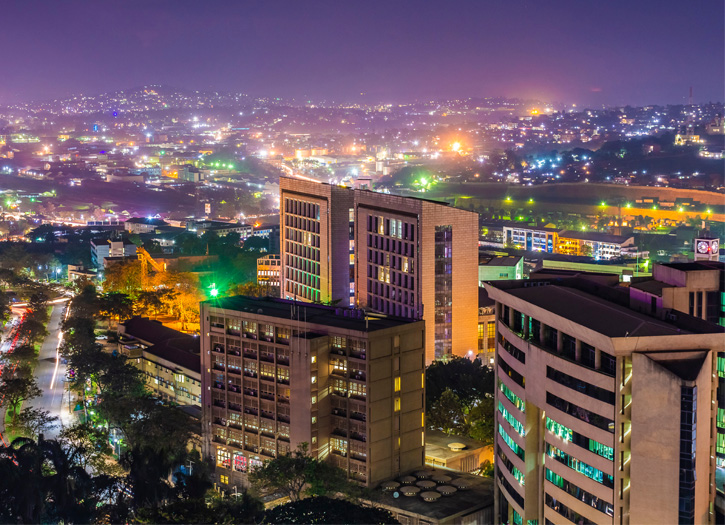The COVID-19 pandemic was confirmed to have reached Uganda in March 2020. On 12 January 2020, the World Health Organization (WHO) confirmed that a novel coronavirus was the cause of a respiratory illness in a cluster of people in Wuhan City, Hubei Province, China, which was reported to the WHO on 31 December 2019.
On 22 March, the first case of COVID-19 in Uganda was confirmed. The confirmed case was a 36-year-old male who had travelled to Dubai on 17 March 2020 for a business trip. On returning to Uganda on 21 March 2020 at around 2 am aboard Ethiopian Airlines, his temperature was said to be at 38.7 during the screening process at Entebbe Airport which prompted the health team at the airport to isolate him at the airport for further follow up. Another eight cases were confirmed by the ministry of health on 24 March and all were cases that came between 17 and 20 March aboard Ethiopian and Emirates flights some on board the same flight as the index case. The same day, all schools and universities were closed for 30 days.
On 26 March, several reports emerged of security personnel beating Ugandans who were out on the streets. Trade Minister Amelia Kyambadde said the government was concerned about the way police and other security agencies had begun treating Ugandans following President Museveni’s suspension of public transport and non-food markets in a bid to prevent the spread of coronavirus. “There has been a misinterpretation of directives. I have been told that restaurants, arcades, salons, shops, supermarkets are being closed. That’s wrong. They should continue to operate as long as they are not in food markets. However, periodic markets that happen weekly are suspended.On 30 March, the President declared a nationwide curfew from 7 pm to 6:30 am, which would run for 14 days to prevent the spread of the disease.
On 28 April, all the 2,400 samples tested were negative.On 29 April, Uganda got 2 positive new cases of coronavirus from 299 samples tested within the community and confirmed cases is 81.On 30 April, 2 new cases were confirmed from 1,579 samples tested from the truck drivers from boarder points of entry. The 2 were both Kenyans who arrived from Busia and Malaba. Therefore, the total number of confirmed cases in Uganda increased to 83 by 30 April.During April there were 39 new cases and 52 recoveries, bringing the total number of confirmed cases to 83 and the number of active cases at the end of the month to 31.
On 11 May, Uganda registered one new case of coronavirus out of the 2,296 samples from truck drivers at the boarder points of entry into Uganda. The new confirmed case was a 45 years old Ugandan male truck driver who arrived in Uganda from Juba via Elegu border point of entry. By 11 May, the total number of confirmed cases were 122.On 18 May, Uganda registered 21 new cases of coronavirus from 1,071 tested samples of various entry points on 17 May. All the 21 cases were Ugandans who arrived from Elegu (17), Mutukula (3) and Maraba (1) entry points. On 1 June, Uganda confirmed 40 new coronavirus cases from 1,319 samples tested by the ministry of health on 31 May 2020. By 23 July, at least 12 people had been allegedly killed by security officers in apparent acts of excessive force when enforcing lockdown measures while the first death from COVID-19 was confirmed the same day.There were 265 new cases in July, raising the total number of confirmed cases to 1154
As a precautionary measure, on 18 March, President Yoweri Museveni banned all incoming and outgoing travel to specified highly affected counties for a period of 32 days.Schools have been closed and public gatherings banned.The president extended the lock down period for another 21 days on top of the 14 days. This lock down period continued from April 15 and will run up to May 5, 2020.He made the announcement on Tuesday while addressing the nation on the status of coronavirus pandemic in Uganda.







Add Comment